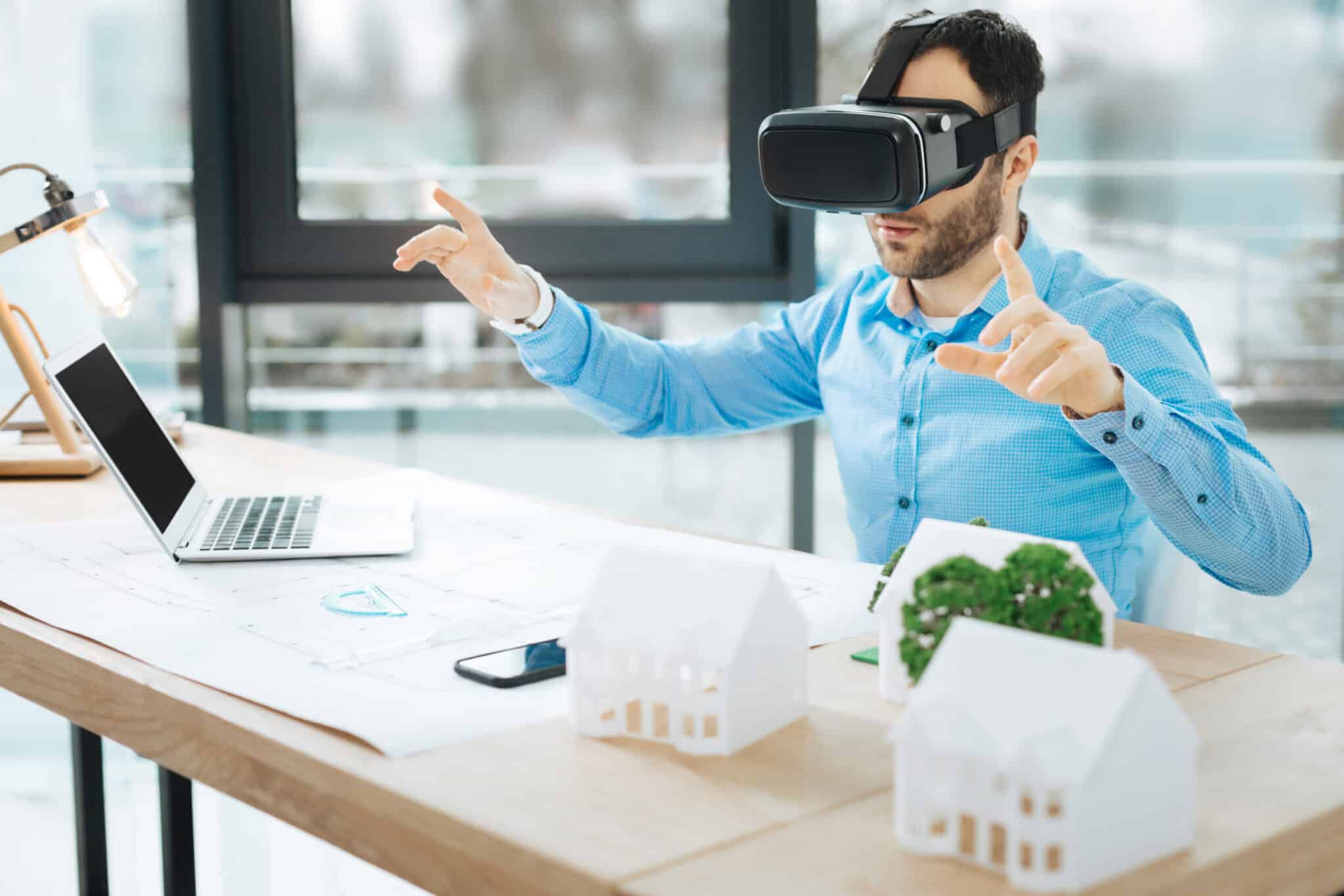The real estate industry is rapidly evolving, and technology is helping to make real estate transactions smoother, more efficient, and more profitable. In 2023, real estate technology trends will be bigger than ever before.
Real estate technology is about to revolutionize the industry from virtual reality tours to automated property management systems.
This article will look at some real estate technology trends that will continue to shape the real estate industry in 2023.
Top Ways Technology is Changing Real Estate
Real estate is one of the world’s oldest and most important economic sectors, and technology has been transforming it in some way since its inception.
Here are some of the most popular real estate technology trends to look out for in 2023:
- Artificial Intelligence (AI)
- Real Estate Education
- Virtual Reality Real Estate
- PropTech
- Conversational AI
- Blockchain
- Big Data Analytics
- Internet of Things (IoT)
- Mobile Apps
- Fractional Property Investing
Let’s take a closer look at each of these real estate trends!
Artificial Intelligence (AI)
In 2023, artificial intelligence (AI) is expected to significantly impact the real estate industry. AI-powered tools, such as chatbots, virtual assistants, and predictive analytics algorithms, are already being used to streamline processes and provide valuable insights into the market.
Data analysis makes identifying real estate investment opportunities much faster, and AI tools help simplify this further. AI made it possible for part-time, independent, novice investors to compete on an equal footing with individuals who have spent their entire lives studying deals and trading real estate.
However, while technology can be a great asset, it should not replace human judgment entirely, as software is only meant to help guide decisions.
Real Estate Education
Education available in real estate investing has had a major impact on the industry, opening it up to a wider range of people than ever before and leading to new opportunities. Today, it’s possible to study a real estate online short course and learn more about the industry and how to spot investing opportunities.
Better education leads to a healthier and stronger industry, with more investors making informed decisions. Online learning has been a key technological change in real estate education, allowing people to learn from anywhere.
These courses offer greater flexibility and improved availability of learning materials in real estate. Online courses are far more accessible than ever before, which means that anyone anywhere in the world can now gain an education in real estate investing.
Virtual Reality Real Estate
Real estate technology is quickly advancing, particularly with augmented and virtual reality (VR) in real estate. VR technology allows potential buyers to explore properties in an immersive 3-D environment that looks and feels like they are physically there.
This technology is revolutionizing the real estate industry and providing a cost-effective way to view properties without traveling in person. Although traditional investors might have apprehension about investing in virtual real estate, by 2026, this market is expected to be worth more than $5 billion.

In addition to helping potential buyers visualize their future homes more accurately, virtual reality enables real estate agents and developers to create fully customizable experiences tailored specifically for each customer. Agents and developers can add virtual furniture and decorations that match the customer’s style and showcase different floor plans during the tours.
They can also utilize other features such as audio commentary or interactive elements like photographs or videos that provide additional information about the property and its amenities. Using VR capabilities for real estate purposes, agents can help clients narrow their choices faster and easier than ever before.
PropTech
PropTech, also known as Property Technology, is a term used to describe the use of technology to improve the performance and efficiency of real estate. It shares some overlap with FinTech, and this technology area has grown significantly over the past few years.
This technology includes property management platforms, apps for tenants and landlords, and tools to simplify the property investing process. PropTech is a fast-growing market with more advanced solutions and tools adopted for asset management, leasing, and property operation each year.
In 2023, PropTech is expected to have an even bigger impact on the real estate industry. There is a huge range of applications for this type of technology, and it can help give more precise valuations, better data analytics, and improved property development.
Conversational AI
Conversational AI is a technology that enables machines to interact with humans naturally and intuitively. In the real estate industry, it is starting to be used more often for services such as customer support and lead generation.
By 2023, conversational AI will revolutionize how customers interact with real estate businesses by providing more personalized experiences. Its technology will allow for more natural and engaging conversations with users due to its ability to understand human language and intonation.
This advanced AI allows for efficient customer service and personalized recommendations tailored to each user’s needs. Moreover, it can be integrated with other digital platforms for a more seamless experience between different systems.
The use of conversational AI also allows for faster responses and data collection. As a result, conversational AI offers a great opportunity for real estate companies to provide better service while reducing overhead costs in the long run.
Blockchain
Blockchain technology is expected to significantly impact the real estate industry. This technology will revolutionize how properties are bought and sold and how agreements are made between buyers and sellers.
Blockchain is a decentralized and secure digital ledger that stores records of transactions across multiple computers. It is immutable and resistant to tampering, making it an ideal platform for recording property rights and ownership information.

It also allows for fast, safe, and cost-efficient transactions in the real estate market and greater ownership transparency. In addition to these benefits, blockchain-based digital tokens can be used to tokenize physical assets such as real estate properties for investment purposes.
These tokens would provide greater liquidity than traditional asset ownership models by allowing investors to trade digital tokens backed by tangible assets such as real estate properties on exchanges.
Big Data Analytics
The impact of big data analytics has quickly become an indispensable tool for businesses in the real estate industry due to its ability to provide insights into customer behaviors, trends, and preferences. Companies can use big data to increase their market understanding and make better-informed decisions.
This technology tracking includes the following:
- Sales Data
- Website Traffic
- Customer Interactions
Big data also create targeted marketing campaigns based on demographic information and past purchase histories. Additionally, companies can leverage big data to gain a competitive edge through predictive analytics.
This technology also allows developers and architects to build smarter buildings and cities by collecting data from sensors that measure energy consumption levels throughout the property.
By analyzing customer data such as location, age, income level, and other demographics, they can identify potential buyers or sellers in their area and tailor strategies accordingly.
Internet of Things (IoT)
The Internet of Things (IoT) is one of the most exciting and rapidly growing trends in real estate technology. IoT systems allow real estate professionals to monitor, track and control various aspects of their properties from a centralized hub via connected devices, sensors, and networks.
This advanced technology provides a comprehensive view of their properties from any location and lets property owners keep better tabs on security issues, energy management, and occupancy patterns.
Additionally, data collected by IoT systems are used for predictive maintenance and analytics that provide insights into improving tenant experience or reducing vacancy rates.
Using the Internet of Things, property owners can save money by reducing operating costs such as electricity and water consumption through intelligent automation.
Mobile Apps
Mobile apps are quickly becoming a major trend in the real estate industry. More and more home buyers, renters, and landlords are turning to mobile apps for their real estate needs.
These applications offer an incredibly convenient way for users to search for properties, browse listings, contact agents, and even sign contracts.
Mobile apps can also provide access to detailed property information such as:
- Pricing History
- Availability Dates
- Neighborhood Data

By leveraging features like geolocation technology, predictive analytics, and AI-powered automation tools, mobile apps can make searching for the right rental or home much faster and easier.
Additionally, this technology is changing the industry by providing a more immersive experience that helps users get a better idea of what they’re buying or renting.
As mobile technology continues to advance rapidly, more companies will likely begin investing in advanced mobile app development solutions to stay competitive in the digital age of real estate.
Fractional Property Investing
Fractional property investing, also known as shared ownership, is a growing real estate technology trend that has become an attractive investment option for many people.
It allows investors to purchase a fraction of a property and gain partial ownership with the potential to generate returns through rental income or capital appreciation.
Since fractional investments are generally easier to acquire than whole units and require less capital investment up-front, they offer an excellent opportunity for individuals who want to diversify their portfolios without taking on too much risk.
These investments can provide higher returns than traditional real estate investments since they can leverage the collective buying power of all owners in the fund.
Additionally, the investor only needs to pay tax on their share of their returns instead of paying it on the entire property value, thereby reducing overall costs.
Conclusion
The real estate technology trends of 2023 will continue to evolve and change the industry. Real estate professionals must stay ahead of the curve by investing in technology that can help them improve their operations and gain a competitive edge.
By utilizing technologies listed in this article, real estate professionals can create more efficient processes, increase customer satisfaction, and drive higher returns on real estate investments.
Are you a real estate agent interested in real estate technology trends? Do you have any questions about the current real estate technology trends? Tell us in the comments below!
Real Estate Tech Trends FAQ
New technology has an immense impact on the real estate industry, from streamlining processes to increasing efficiency and providing more comprehensive data. For instance, VR technology transforms how real estate professionals engage with clients for showings or presentations.
Real estate agents can now provide immersive 3D home tours to buyers from any location, allowing them to explore the house without actually being there. This helps buyers make informed decisions faster and makes the process much more efficient for buyers and agents alike.
The current real estate trends include the rise of fractional property investing, IoT, mobile apps, AI-powered automation tools, and leveraging geolocation technology, to name a few.
These technologies are helping real estate professionals to streamline their operations and create more efficient processes.
Technology is revolutionizing real estate in a variety of ways.
It has enabled real estate professionals to conduct more efficient processes and quickly reach potential buyers or sellers.
It has also opened the market to fractional property investing, allowing investors to purchase portions of real estate without having to invest large amounts of capital.
Fractional property investing is an investment strategy that allows individuals to purchase a portion of real estate, such as a single-family home or commercial building.
The owner has partial ownership and can generate returns through rental income or capital appreciation. Fractional investments are generally easier to acquire than whole units and require less capital investment up-front.
Artificial intelligence (AI) is revolutionizing how agents do business by allowing them to automate tedious tasks like sifting through information or responding quickly to client inquiries.
AI makes it easier to match buyers with the right properties and identify new markets ripe for investment opportunities. AI also streamlines property management by automating tasks such as maintenance scheduling or tenant communications.
Additionally, AI can help agents analyze massive amounts of market data to identify potential risks or areas where pricing could be more accurately adjusted based on current market conditions.
Big data analytics can be used to better understand target audiences, which can be valuable to buyers and sellers when it comes to marketing their properties.
Businesses can use big data analysis to learn more about their customer base, such as the types of properties they’re looking for and where they’re located. This information can create targeted campaigns that reach out directly to potential home buyers in specific areas.
Additionally, big data analytics also helps businesses make more informed decisions when pricing their properties competitively with other similar homes on the market.
Virtual reality (VR) is becoming increasingly popular in real estate as an efficient way for potential buyers to get an immersive look at a property before committing to a purchase or signing any contracts. With VR technology, users can take virtual tours of homes and walk around 3D models of floor plans without having to visit them first.
This allows them to get an up-close view of various aspects of each home, such as furniture placement or window orientation, from anywhere in the world, potentially saving them time and money on trips out-of-town just for viewing properties.
Additionally, some agents use VR technology during open houses so that visitors can experience the property from all angles without having to interact with anyone else who may be there simultaneously.
Technology is disrupting the real estate industry in many ways. Most notably, it has enabled real estate companies to become more efficient in serving their clients and customers.
Businesses can better understand consumer behavior and preferences through data, analytics, and AI. This allows buyers and sellers to make smarter decisions when choosing properties or to negotiate deals.
Agents can also access more powerful tools to analyze data quickly and present insights on potential deals. In addition, technology has provided the ability for businesses to offer more tailored services that meet customers’ needs.
Before investing in real estate technology, it is important to assess your current needs. You may need a tool or platform that can help you manage real estate listings and track customer interactions or something that provides real-time data analysis.
It all depends on the real estate business you run and the technologies available in the market. Do your research and find out what real estate technology best suits your needs.
Businesses can leverage real estate technology trends to increase their productivity. For instance, they can use AI-powered automation tools to streamline processes and reduce manual labor.
They can also use real estate analytics to gain insights into the market and make more informed decisions regarding pricing or marketing strategies. Additionally, businesses can leverage real estate mobile apps to increase their reach and make it easier for customers to interact with them.
As the real estate industry continues to evolve, businesses need to stay up-to-date with the latest real estate technology trends to remain competitive. By doing so, they can maximize their productivity and improve their bottom line.
Real estate agents can benefit from adopting new technologies in numerous ways. Agents can improve their efficiency and productivity by taking advantage of cloud computing for storing customer data more securely and using big data analytics to gain valuable insights into their target market.
Moreover, real estate agents can use real-time data analysis to better understand market trends and create more effective marketing strategies. Additionally, real estate agents can leverage mobile apps to make it easier for clients and customers to interact with them.
Real estate technology can help streamline the home buying and selling process in various ways. For instance, 3-D virtual reality tours can provide real estate agents with an immersive experience that allows potential buyers to see properties without actually visiting them.
AI-powered automation tools can also reduce manual labor and streamline processes. Additionally, real estate companies can leverage geolocation technology to help buyers and sellers find the perfect home in their desired location.
Like any other technology, real estate technology trends can come with certain challenges. For instance, real estate companies must ensure they have the IT infrastructure and personnel to handle new technologies.
In addition, businesses should be aware of data privacy regulations and security measures when using real estate technology. When introducing real estate technology into their operations, businesses must conduct thorough user testing and ensure it is easy to use.


